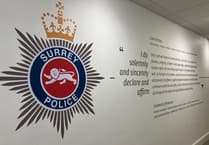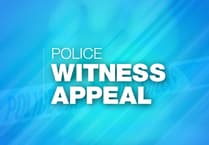Hampshire Police are leading a call to action, urging the public and professionals to better recognise the often-missed warning signs of stalking.
As part of National Stalking Awareness Week, Police and Crime Commissioner Donna Jones is spearheading a regional campaign focused on this year’s theme: ‘Health Response: Spotting Stalking’, which highlights stalking as both a criminal offence and a serious public health issue.
The campaign emphasises the need to treat stalking not only as a criminal offence but also as a pressing public health issue.
“For every person who reports stalking, there are hundreds of missed chances to intervene,” said Ms Jones.
“As a former magistrate and now as Police and Crime Commissioner, I’ve listened to countless victims describe the slow creep of stalking. It often starts with confusion with victims questioning themselves, ‘Am I overreacting?’ and ends with fear, isolation and exhaustion.”
Stalking is often dismissed or misunderstood in its early stages. It might look like persistent messaging, showing up unexpectedly, or online monitoring—acts that might appear innocuous at first but quickly become invasive and terrifying.
Victims often feel they must overhaul their lives—moving homes, changing jobs, or disappearing from social media—in desperate attempts to evade their stalkers.
“What makes it harder is that stalking often hides in plain sight,” said Ms Jones.
“Victims rarely call it stalking at first and it can be physical or just online. That’s why training for all agencies matters, not just for police but also for doctors, nurses, and therapists. Friends and family can also help a loved one seek help.”
The Hampshire and Isle of Wight Constabulary is renewing its commitment to confronting stalking head-on, with enhanced officer training and an emphasis on early intervention.
“Stalking is a serious and distressing crime that can escalate and, in some cases, lead to serious harm,” said Detective Chief Inspector Abbie Leeson, the constabulary’s tactical stalking lead.
“It often has a profound and lasting impact on victims’ lives.”
DCI Leeson added: “Our multi-agency approach, working closely with partners in health, advocacy and the criminal justice system is key to achieving the best outcomes.”
Victims are encouraged to report concerns as soon as they arise. “You don’t need to gather evidence before speaking to us,” she said. “Your information could help us bring the offender to justice and keep others safe.”
The region’s approach is already earning national recognition.
A 2024 report by the Suzy Lamplugh Trust highlighted Hampshire Police for their exemplary handling of stalking cases, praising their multi-agency coordination and investment in both victim support and perpetrator-focused interventions.
Building on this momentum, over 100 professionals attended a landmark multi-agency stalking conference earlier this year. Hosted by the PCC’s office, the event brought together police, healthcare providers, charities, and frontline services to deepen their understanding of stalking and to explore safe, early interventions.
“In 2024 I funded the Stalking Advocacy Support Service to give people across Hampshire and the Isle of Wight confidential support, legal advice, and safety planning,” said Ms Jones. “It’s clear too many victims still suffer in silence but support is available.”
Stalking often follows the same chilling pattern: Fixated. Obsessed. Unwanted. Repeated. This could be anonymous gifts, online harassment, or someone loitering near home or work.
And the message from Hampshire and the Isle of Wight this week is clear: stalking is not harmless, and it’s time to call it what it is.
For more information, or to seek help call 0330 0533 630 or visit www.stopdomesticabuse.uk/stalking




